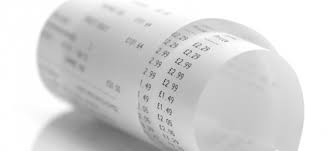Would You Like Your Receipt? Read This Before You Answer

The last time you went to the mall, did the salesclerk ask you if you wanted your receipt handed to you, in the bag, or emailed to you? Your first thought may be to grab the receipt and shove it in your purse or pocket. Think twice before you do this again. There is an important reason to forgo the printed receipt altogether, unless absolutely necessary.
Thermal papers used to print cash register, airline, restaurant, gas station and ATM receipts contain a potentially dangerous chemical called bisphenol A (BPA). In fact, 40% of all retail receipts are coated in BPA. You may have heard of BPA in plastics, baby bottles (which has recently been banned by the FDA), and as a liner in canned food. Our bodies become exposed to BPA when we eat or drink from a BPA-lined can or plastic container. But it can also be absorbed through the skin from receipts printed on thermal paper. In addition to human exposure, there is also concern over the release of BPA into the environment.
Thermal receipt paper is the shiny paper that prints out ink that smudges easily. Remember the old fax machine paper? To produce a receipt, the paper is coated with a dye and a developer (this is where BPA is added). Heat from the printer produces a chemical reaction, allowing the black print to appear. A study conducted by the University of Missouri, Division of Biological Sciences laboratory showed that BPA levels in receipt paper are 250 to 1,000 times higher than BPA found in food from BPA-lined cans. That doesn’t mean that receipt paper residue is as easily absorbed in the bloodstream as when ingested through food and beverage containers containing BPA, but it does cause reason for concern.
Just last week on June 22nd, President Obama signed into law the Frank R. Lautenberg Chemical Safety for the 21st Century Act, which will become the Nation’s primary chemical management law. The new law includes a mandatory requirement for the Environmental Protection Agency (EPA) to evaluate existing chemicals with clear and enforceable deadlines, starting with those “most likely” to cause risks.
BPA is chemically similar to the hormone estrogen, and is a member of a class of chemicals known as “endocrine disruptors.” BPA potentially disrupts estrogen, thyroid, and testosterone levels, which means that it can be linked to conditions like obesity, diabetes, endometriosis and Polycystic Ovary Syndrome (PCOS). High BPA levels in men and women can contribute to infertility.
The next time you are offered a receipt, either decline it or take it in the bag. If emailing is an option, you could create an email account solely for receipts so that everything is in one place. Try avoidng placing receipts in a bag with raw foods. If you need to keep important printed receipts, put them in a Ziploc bag and seal it to keep exposure to a minimum. It is a good idea to wash your hands after handling receipts. There have also been studies suggesting that using hand sanitizers or hand creams prior to touching thermal paper can cause a higher rate of BPA absorption, so don’t sanitize your hands before going to a place where you may be handed a receipt. If you know a company is printing on thermal paper receipts, you can ask them to switch to a BPA-free paper manufacturer. Appleton Paper is the largest manufacturer of thermal paper receipts in North America, and they went BPA-free in 2006. Although some of the BPA alternatives still contain potentially harmful chemicals, this is a step in the right direction!
“Would you like your receipt?”
“No, thanks.”
Sources:
https://Jama.jamanetwork.com/article.aspx?atricleid=1832525
https://www.saragottfriedmd.com/how-hormones-disrupt-your-health-and-weight/
http://www.reuters.com/article/us-endocrine-disruptor-idUSBREA1O1U020140225
http://health.howstuffworks.com/wellness/avoid-bpa-exposure-from-cash-register-receipts.htm
http://journals.plos.org/plosone/article?id=10.1371/journal.pone.0110509


